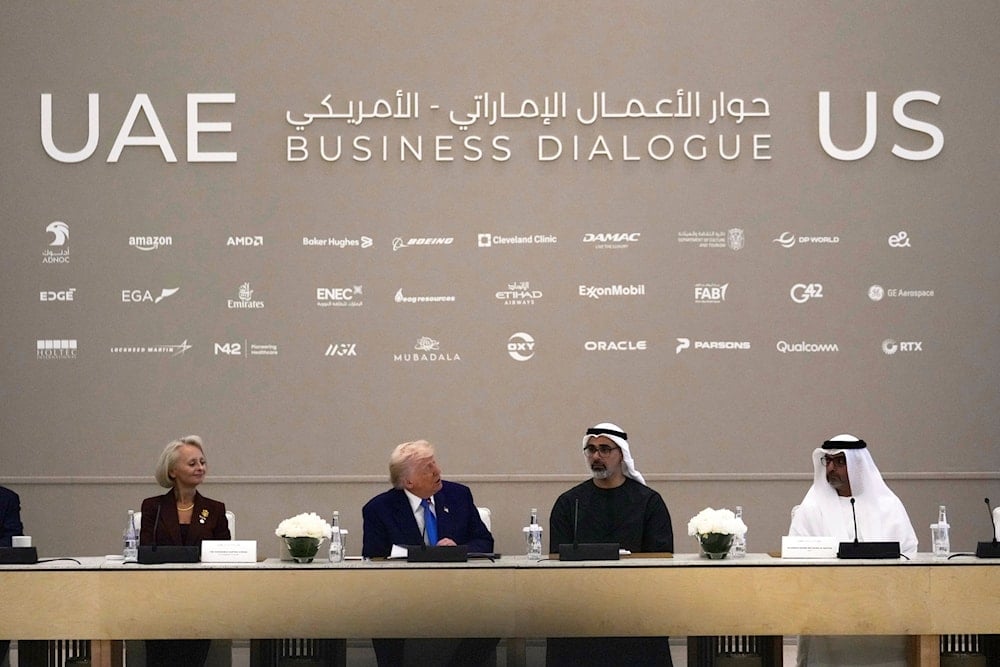Security fears stall massive UAE data hub deal with US tech giants
Stargate UAE, a multi-billion-dollar AI project backed by G42 and US tech firms, faces delays due to unresolved US security protocols on AI chip exports.
-

US President Donald Trump attends a business meeting and roundtable at Qasr Al Watan, in Abu Dhabi, United Arab Emirates, on Friday, May 16, 2025 (AP)
A multi-billion-dollar deal to construct one of the world’s largest AI data center hubs in the UAE using US technology faces delays as unresolved security concerns continue to complicate negotiations, Reuters reported, citing sources familiar with the matter.
During President Donald Trump’s two-day visit to Abu Dhabi last month, the US and the wealthy Gulf state announced plans for a massive artificial intelligence campus project, which includes the development of a cluster of high-powered data centers.
The proposed 10-square-mile AI campus, backed by G42, an Emirati state-affiliated technology company spearheading the UAE's artificial intelligence sector, is currently in development.
The first phase of the project, named Stargate UAE and scheduled for launch in 2026, involves collaboration between G42 and major tech firms, including Nvidia, OpenAI, Cisco, Oracle, and Japan’s SoftBank.
The initiative, designed to incorporate cutting-edge Nvidia AI chips, has been championed by Trump administration officials as a "strategic success" in encouraging Gulf nations to adopt US technology rather than Chinese options.
However, five sources familiar with the project reveal that US officials have not yet finalized the security protocols for exporting the advanced AI chips or established enforcement mechanisms for the agreement with the UAE, leaving critical aspects of the deal unresolved
Challenges undermines Gulf's AI pursuit
According to a Financial Times report, experts warn that despite Saudi Arabia and the UAE’s ambitious AI plans, both face challenges, including skilled worker shortages compared to Silicon Valley or Shanghai, and research output lagging behind global leaders.
The development of advanced AI research in the region, particularly in Arabic large language models, is being spearheaded not by private sector innovation but by government-backed organizations operating under royal patronage.
MBZUAI President Eric Xing explained to FT that the UAE's relatively modest research output stems from its small population of 10 million and still-evolving higher education system, while stressing the nation's deliberate prioritization of research quality over quantity.
Although researchers affiliated with the six-year-old university have published work in areas, such as protein modeling, the most transformative breakthroughs in the field still emerge primarily from Western institutions, including Google's London-based AI unit, DeepMind.
US concerned Gulf could turn to China
Karim Sabbagh, managing director of UAE-focused satellite mapping firm Space42, told the FT that the Gulf states' technological ambitions cannot be realized independently, emphasizing the necessity of forming strategic partnerships with aligned collaborators to achieve success.
Despite promises of commitment to the United States, US security officials remain wary about Gulf nations upholding their commitments amid their aggressive push to become AI leaders.
Analysts caution that Gulf nations' aggressive pursuit of AI leadership risks eroding security safeguards, with RAND Corporation's senior technology adviser Jimmy Goodrich highlighting particular fears that these countries may turn to Chinese labor or companies as expedients in their tech development, a move that could introduce significant security risks.

 3 Min Read
3 Min Read








